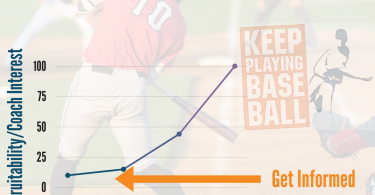Many parents start dreaming of seeing their son play college baseball when they buy his first tiny glove or tee ball bat. If your son shows some talent early, you’re probably thinking that the scholarship is in the bag. But it is not so simple; talent is not the only thing that will get your son into college. In fact, you should be more concerned with understanding eligibility and making sure your son is in the right classes than worrying about him getting seen by college coaches. We encourage you to read through the rest of the articles and pages on this website to learn more about what it takes to be a college athlete. But most importantly, before your son starts high school, you should bookmark www.ncaa.org and get to know all of the rules about athletic eligibility. These rules can change over time, so you want to keep checking back. You don’t want to get a call from a recruiter during your son’s junior year and find out that your son hasn’t taken the classes or tests to be eligible for his dream school. If you have any doubts or questions, contact the NCAA directly before you make assumptions or decisions. Some important things to know:
- There are rules about what classes your son must take in high school. While your son should take the lead in many steps of the recruitment process, the rules about classes can be confusing, and you should be involved when he makes class choices (along with the guidance counselor) to make sure that he selects from the NCAA approved core courses at his school. To be eligble to play, players must take a certain number of NCAA core courses in several different categories, like Math, English, Science, and Social Studies. If he does not take the right courses, the college coach cannot fix it no matter how much he wants your son to play for his team.
- There are rules about minimum GPAs and test scores that will allow your son to play college baseball. While studying for classes and preparing for tests will be your son’s responsibility, you’ll need to be a consistent resource for your son. Your son may need reminders about his goals or occasional help with his homework. Each governing body (NCAA/NAIA/NJCAA) sets minimum GPA and SAT/ACT score requirements for eligibility. Keep in mind that minimums won’t always be enough to get your son into his dream schools. Encourage him to do the best he can, on the field and in the classroom.
- There are rules about what it means to be an “amateur” athlete. If your son works with an agent or plays professionally, he may not be eligible for college sports. Check the rules before you accept financial assistance, agree to any contact with an agent or get paid to play.
- There are rules about what substances can be used by your son. There are some supplements or medications that contain chemicals that are banned by the NCAA. Just because something is sold over the counter or prescribed for your son, it does not mean that the NCAA approves it. If your son is taking any supplements or medications, be sure to check out the “Drug Testing” link under the “Health and Safety” tab at NCAA.org so that your son stays eligible to play. Common drugs for ADHD, for example, often require a waiver from the NCAA, even when they are prescribed by a doctor.
- The NCAA sets rules about how and when coaches can contact your son. Learn these rules so that your son knows when to contact coaches and what to expect after he does that. There are times during the year that coaches are not allowed to have face-to-face contact with players. Be sure to check KPB’s guide to the recruiting rules for different levels of college baseball and always be sure to double check the NCAA website for rule changes (they differ by grade-level and division) so that your son doesn’t get discouraged if a coach is not responding to him.
- The NCAA posts a publication on their website called “Guide for the College Bound Student Athlete.” This publication is a great resource for you and your son and you can download a PDF for free.
Important Note: We’ve used this article to talk about rules set up by the NCAA because many parents and players dream of being a part of Division 1 baseball (and going to Omaha!) but there are other organizations like the National Association of Intercollegiate Athletics (www.naia.org) or National Junior College Athletic Association (www.njcaa.org) that set rules for player eligibility in their participating schools. The bottom line is the same; if your son is not eligible to play, no amount of talent can get him recruited to play on a college team. So start early, get to know the rules, keep your son on track, and you can look forward to watching your son succeed on and off the field.







